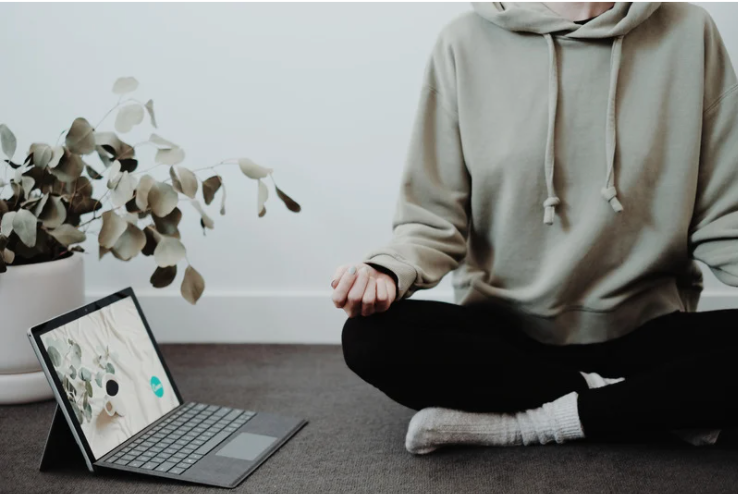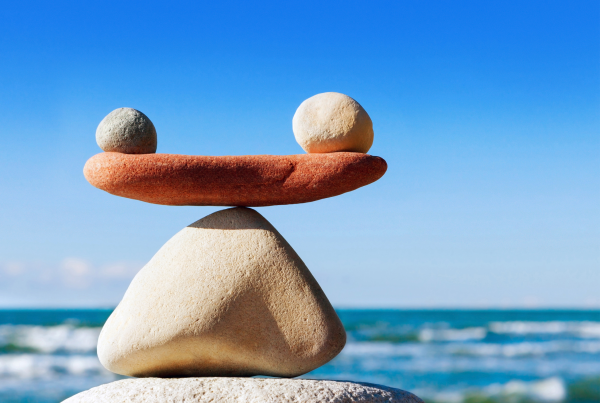The suggestion of meditation to our clients can come with mixed responses…
“It’s not really my thing”
“I’ve tried, my brain is too busy for it”
“I don’t need a third eye” (Yes, this one is an actual quote!)
But while meditation can seem a bit ‘out there’ for some people, many others reap the benefits of improved stress management, better sleep, and mood control. Slowing the mind and tuning into simple sensations, such as your own breathing, works wonders for a mind in overdrive!
The scientific community has developed quite an interest in the topic – there are more and more research studies coming out that look at the effectiveness of meditation for wellbeing, both in regard to mental and physical health. One particular area that has received a lot of attention is the use of meditation for chronic pain. And for good reason! The crossover between mental health and physical health is significant, so let’s explore them both.
(Mindfulness) Meditation for Mental Health
There are many different types of meditation, but one particular form is known as ‘mindfulness meditation’. Mindfulness refers to the ability to be aware of what is going on around you (for example, awareness of the 5 senses – what you can see, hear, smell, feel and taste), and awareness of what is going on within you (emotional states, thoughts, sensations).
Mindfulness meditation is used a lot in the context of mental health conditions. Individuals with panic disorders are often encouraged to focus on their external sensations to provide grounding, i.e. bringing their attention away from the internal sensations that may be distressing, such as breathlessness or a racing heart, during a panic attack. Those with anxiety and depression often benefit from becoming more aware of their internal monologue and identifying the negative or inaccurate thought patterns that are playing on repeat.

Meditation for Chronic Pain
It is well known that chronic pain conditions are strongly influenced by an individual’s psychology – not only their thought patterns, but their global belief systems, their interpretation of the world, and the decisions / behaviors that result. So it makes sense that meditation – where you learn to be more aware of (and in control of) your thoughts – would be beneficial in the context of chronic pain. Being able to develop a more objective awareness of sensations, without being as emotionally connected to them, is important.
Stress levels also impact on pain levels at a physiological level – the increases in hormones that come with stress result in increased pain sensitivity. So using meditation as a means of managing stress levels means that the body is less likely, at a physiological level, to be triggered by pain signals.
But the proof is in the pudding… Here is some research that supports it.
The Science!
In a (randomised control) trial with 109 participants (1), half of the participants received a 10 session mindfulness-based stress reduction course, while the other half were placed on a waiting list. Significant differences were found for improved quality of life (based on a self-reported wellbeing questionnaire), reduced anxiety and depression, higher feelings of control over their pain, and increased acceptance between the two groups. There was also a positive trend towards reduced pain measures, although not reaching statistical significance.
A meta-analysis (2) of 8 studies (with a total of 1,234 participants) found that meditation was better than ‘usual care’ for reducing short-term disability, and long-term pain intensity, in adults with lower back pain. Interestingly, meditation did not significantly influence pain intensity in the short or medium term, suggesting that meditation may have the greatest impact when done consistently for longer periods of time. Practice makes perfect after all! And meditation is definitely one of those things that get better with practice.
Another meta-analysis (3) looking specifically at headaches found significant improvements in pain intensity, as well as a reduction in the frequency of headaches with meditation. Another review article (4) concludes that the research done on mindfulness-based interventions (including yoga and stress reduction) shows moderate, consistent reductions in pain. They state that: “Mindfulness provides an effective treatment modality that can be used either in isolation, or alongside traditional pain management treatments.”
Summary
Whether improving pain levels directly, or improving mental health and coping capacity overall, the research shows that there’s something to be said for meditation. The science is in agreement (for once!) – there is a lot to be gained, and nil to be lost.
It’s free, safer than other methods (keep an eye on our podcast for some intel on opioids. . ), and can be done anywhere, without any fancy equipment.
If meditation will improve mental health and stress at the same time, why not give it a go? To those whose initial response is similar to those above, it may be time to think again!
References:
- Effects of Mindfulness Meditation on Chronic Pain: A Randomized Controlled Trial (la Cour & Peterson, 2015)
- Meditation for adults with non-specific low back pain: a systematic review and meta-analysis (Soares et al. 2021) – https://pubmed.ncbi.nlm.nih.gov/34516731/
- Mindfulness Meditation for Primary Headache Pain: A Meta-Analysis (Gu et al, 2018)
- Mindfulness-based interventions for chronic pain: Evidence and applications (Majeed et al, 2018)
Author: Yolanda van Vugt
Clinical Exercise Physiologist and Content Creator at Specialised Health
Let’s connect, find us:
Have you got a claimant that would benefit from E.P. support? Refer to the team!
#exercisephysiology #exerciserehab #rehabilitation #lifeinsurance #incomeprotection #ctp #workcover #mobile #telehealth #telehealthprogram #mobileexercisephysiology #returntowork #prehab #fatigue #mentalhealth #cancer #musculoskeletal #pain #physio #physiotherapy #Sydney #Brisbane #Melbourne #Adelaide #Auckland #Waikato #BayofPlenty #Wellington #Otago #Christchurch



